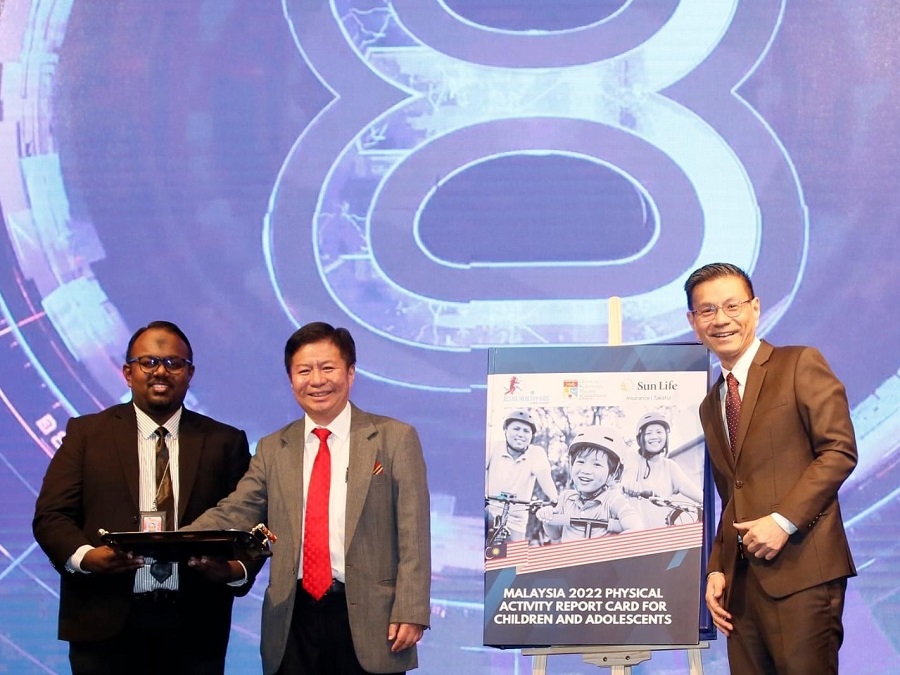The findings from ‘Malaysia 2022 Physical Activity Report Card for Children And Adolescents‘, jointly released yesterday by Sun Life Malaysia, a leading life insurance and family takaful provider, Active Healthy Kids Global Alliance (AHKGA) and Universiti Kebangsaan Malaysia (UKM), highlighted that Malaysian youth attained a D minus (D-) for overall physical activity, signalling a need to increase the physical activity levels of Malaysian children and adolescents, especially in the post-pandemic era.

Sun Life has partnered with the AHKGA and UKM, as the lead research university, to support the Malaysia 2022 Physical Activity Report Card for Children and Adolescents, which was developed as part of AHKGA’s Global Matrix 4.0 initiative and represents an evidence-based synthesis of children’s and adolescents’ behaviour towards physical activity in Malaysia. By using a series of indicators related to daily behaviours, settings and sources of influence, strategies and investments, and other factors, the report card provides insights and recommendations for improving the physical health of young people in Malaysia and around the world.
The report card was officially unveiled by Professor Dato’ Dr Hanafiah Harunarashid, Pro Vice Chancellor of UKM, together with Ho Teck Seng, Deputy Chief Executive Officer of Sun Life Malaysia and Associate Professor Dr Mohd Razif Shahril, Chairman of Active Healthy Kids Malaysia, UKM.
Speaking at the event, Ho Teck Seng, Deputy Chief Executive Officer of Sun Life Malaysia said, “Sun Life Malaysia is proud to be supporting this initiative as this is an extension of our purpose to help people live healthier lives. We hope to contribute to AHKGA’s overall ambition to encourage children’s healthy lifestyles through thought leadership, capacity building, advocacy, and awareness.”
“At Sun Life, we believe that a sustainable future depends on a healthy and resilient younger generation. We believe that the findings from the report card will help stakeholders, policymakers, educators, and even parents identify more effective ways to encourage our youth to adopt healthy living habits,” Ho added.
“Children and adolescents are not moving enough to promote healthy growth and development, and the COVID-19 pandemic only made matters worse. AHKGA is pleased to be working with Sun Life to promote the physical activity of children and adolescents in Malaysia and around the world. Through our shared commitment to getting children and adolescents more physically active, we aim to promote their health and wellness, and that of their families, neighbourhoods and communities,” said AHKGA President Dr Mark Tremblay, who is also a Professor of Pediatrics at the University of Ottawa in Canada.
“Physical inactivity is acknowledged as a risk element for major non-communicable diseases (NCDs). The Report Card represents collective efforts to gain a better understanding of the health and well-being status of our children and adolescents. Looking at the findings, urgent action is needed, and it is a shared responsibility to improve the physical activity status of our future generation,” said Associate Professor Dr Mohd Razif Shahril, Chairman of Active Healthy Kids Malaysia, UKM.
A panel discussion titled “Keeping Malaysian Youth Active – The Great Reset Post Covid-19” was also held during the event. It featured panel speakers, Professor Dr Poh Bee Koon, Chair of the UKM Health and Advanced Medical Research Cluster; Ho Teck Seng, Deputy CEO of Sun Life Malaysia; Ithnin Mahadi, Deputy Director of the Sports, Co-curricular and Arts Division from the Ministry of Education Malaysia, and Dr Vanitha Subramaniam, Head of Population Wellness Branch, Health Education Division, Ministry of Health Malaysia, who discussed practical measures to help children and adolescents improve their physical activity.
As a brand advocating healthier lives, Sun Life Malaysia has invested over RM3 million in various programmes and partnerships, including a nationwide blood glucose screening programme, physical and mental wellness workshops, as well as financial-wellness activities, to help Malaysian communities break down the barriers to better health.
Other interesting findings
The Report Card also uncovered other interesting findings showing that Malaysia is lagging behind other countries in several key indicators, for example:
- One-fifth (20 per cent) of Malaysian adolescents use active transportation to and from schools, resulting in a score of D minus (D-).
- For diet, Malaysia also scored a D minus (D-), where just 23.5% per cent of adolescents aged 13-17 achieved the recommended daily serving of fruits and vegetables.
- Malaysia scored a B minus (B-) on weight status, reporting that although more than half of children and adolescents aged 5-17 were normal weight (60.2 per cent), 15 per cent were overweight, and 14.8 per cent were classified as obese.
- Malaysian adolescents ranked in the 67th percentile for extent flexibility, which indicated that their flexibility levels are average relative to international norms, resulting in Grade.
On a positive note, the Malaysian national schools received a Grade A minus (A-) for regular access to facilities and equipment that support physical activity. This grade is the highest received among all indicators and showed an increase as compared to the 2016 Report Card which attained a B plus (B+).
For sedentary behaviour, the indicator showed some improvement from grade D to C of Malaysian school-going adolescents aged 10 to 17 years who watched television and computers and played video games for no more than two hours per day.
To know more about the Report Card findings, visit http://activehealthykids.org.my/
Source: SunLife Malaysia
